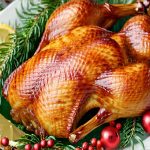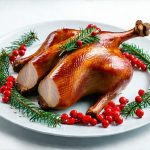The holidays are often synonymous with abundant food, festive gatherings, and cherished traditions. However, for individuals who regularly experience reflux (heartburn), nausea, or bloating, this time of year can bring added stress and discomfort. The sheer volume of rich foods, sugary treats, and potentially triggering ingredients present at holiday meals can quickly derail digestive health and dampen the joy of the season. It’s a common struggle – wanting to participate in celebrations without sacrificing well-being. Navigating these challenges requires mindful planning and a proactive approach to eating, allowing you to enjoy the festivities while minimizing unwanted symptoms.
Many people find that typical holiday fare—think creamy casseroles, fried foods, chocolate desserts, and carbonated beverages—are precisely what exacerbate their digestive issues. This isn’t about deprivation; it’s about making informed choices and adapting recipes or portion sizes to better suit your individual needs. Understanding your specific triggers is key. Keeping a food diary leading up to the holidays can be immensely helpful in identifying which foods consistently cause problems, allowing you to plan accordingly. Remember that managing these conditions isn’t about completely eliminating enjoyable foods but about finding a balance between indulgence and comfort. You might even want to explore best breakfast options if mornings are particularly difficult.
Pre-Holiday Preparation & Mindful Planning
Preparation is arguably the most important step towards a comfortable holiday season for anyone with digestive sensitivities. Don’t wait until the feast begins to think about how you’ll manage your symptoms. Instead, proactively assess potential challenges and develop strategies before the celebrations start. This includes considering what foods are likely to be served, identifying alternatives where possible, and mentally preparing yourself for situations that might tempt you to overindulge.
A crucial element of pre-holiday planning is communication. If you’re attending a gathering hosted by someone else, politely inform the host about your dietary needs or sensitivities. Most people are happy to accommodate requests, especially if they understand the reasons behind them. You can offer to bring a dish that you know won’t trigger your symptoms, ensuring there’s at least one safe option available. This also allows you to control ingredients and portion sizes. Don’t be afraid to advocate for yourself – it’s perfectly acceptable to prioritize your health during the holidays. Learning eating mindfully can also help with this process.
Finally, don’t underestimate the power of portion control. Even seemingly “safe” foods can cause discomfort if eaten in excessive quantities. Visualizing appropriate serving sizes beforehand, and consciously limiting how much you put on your plate, can significantly reduce bloating and reflux. Remember that it’s okay to leave food on your plate – enjoying a smaller portion without feeling deprived is far better than suffering through hours of digestive distress afterward. If you are concerned about what might trigger issues, take a look at foods that trigger bloating and nausea.
Navigating the Holiday Meal: Strategies for Comfort
When the holiday meal arrives, resist the urge to dive in immediately. Slowing down and practicing mindful eating are essential for minimizing discomfort. This means taking small bites, chewing thoroughly, and savoring each mouthful. It also means paying attention to your body’s signals of fullness – stopping when you feel comfortably satisfied, rather than stuffed. This is perhaps one of the hardest aspects, but it pays dividends in terms of comfort later on.
Focus on foods that are generally well-tolerated by individuals with reflux, nausea or bloating. Lean proteins like turkey (without skin), steamed vegetables, and small portions of whole grains are often good choices. Avoid highly processed foods, fried items, and excessive amounts of sugar or fat. Be mindful of hidden triggers – for example, mint can sometimes exacerbate reflux symptoms in some people. Also, watch out for spicy foods which can also contribute to discomfort.
Consider your beverage choices carefully. Water is always the best option, but if you’re looking for something more festive, sparkling water with a slice of lemon or lime can be a refreshing alternative to sugary sodas or alcoholic beverages. Limit caffeine and alcohol consumption, as both can worsen reflux symptoms. If you do indulge in alcohol, sip it slowly and alternate with water. Planning ahead is key – consider travel tips if your holiday involves travel.
Dealing With Nausea During Festivities
Nausea during the holidays isn’t uncommon, even for those who don’t usually experience it. Several factors can contribute to this, including overeating, food sensitivities, motion sickness from travel, or simply the stress of social gatherings. Having a plan in place to manage nausea proactively is essential.
- Carry ginger chews or crystallized ginger with you – ginger has been shown to have anti-nausea properties.
- Sip on clear fluids like water or herbal tea. Avoid sugary drinks, which can sometimes worsen nausea.
- If you feel nauseous during a meal, excuse yourself and step outside for some fresh air. A short walk can often help settle your stomach.
- Over-the-counter remedies such as bismuth subsalicylate may offer temporary relief, but always follow the package instructions carefully.
If nausea persists or is severe, don’t hesitate to seek medical attention. It’s important to differentiate between holiday-related discomfort and a more serious underlying condition. Taking a few minutes for yourself—a quiet moment away from the festivities—can also help calm your nerves and reduce feelings of nausea. Remember to consider eating in public if you’re concerned about managing symptoms outside the home.
Managing Reflux & Heartburn Flare-Ups
Holiday meals are notorious for triggering reflux symptoms. The combination of rich foods, large portions, and potential overindulgence can quickly lead to heartburn. Being prepared with strategies to mitigate flare-ups is crucial for maintaining comfort throughout the season.
- Avoid lying down immediately after eating. Gravity helps keep stomach acid where it belongs.
- Elevate the head of your bed if you experience nighttime reflux. This can be as simple as placing a few books or blocks under the mattress frame.
- Consider taking an over-the-counter antacid if you normally use them and have discussed it with a healthcare professional. These can provide temporary relief, but are not a long-term solution.
- Avoid tight-fitting clothing, which can put pressure on your abdomen and worsen reflux symptoms.
Remember that prevention is key. By making mindful food choices and practicing portion control, you can significantly reduce the likelihood of experiencing a reflux flare-up in the first place. You might also find it helpful to review managing indigestion after holiday meals.
Minimizing Bloating & Discomfort
Bloating is another common digestive complaint during the holidays. The combination of high-fiber foods, carbonated beverages, and potentially triggering ingredients can lead to uncomfortable gas and distension. Here are some strategies for minimizing bloating:
- Identify and avoid known trigger foods, such as beans, broccoli, cabbage, onions, and artificial sweeteners.
- Drink plenty of water throughout the day to help move food through your digestive system.
- Chew gum carefully – while it can sometimes stimulate digestion, excessive chewing can also lead to swallowing more air, which contributes to bloating.
- Consider incorporating probiotic-rich foods into your diet, such as yogurt or kefir (if tolerated). Probiotics can help support a healthy gut microbiome and reduce bloating.
- Gentle exercise after a meal can aid in digestion and alleviate bloating. A short walk is often sufficient.
It’s important to remember that the holidays are meant to be enjoyed. Don’t let digestive issues completely overshadow your celebration. By prioritizing mindful eating, proactive planning, and self-care, you can navigate the season with comfort and confidence, allowing you to fully participate in the festivities without sacrificing your well-being.


















